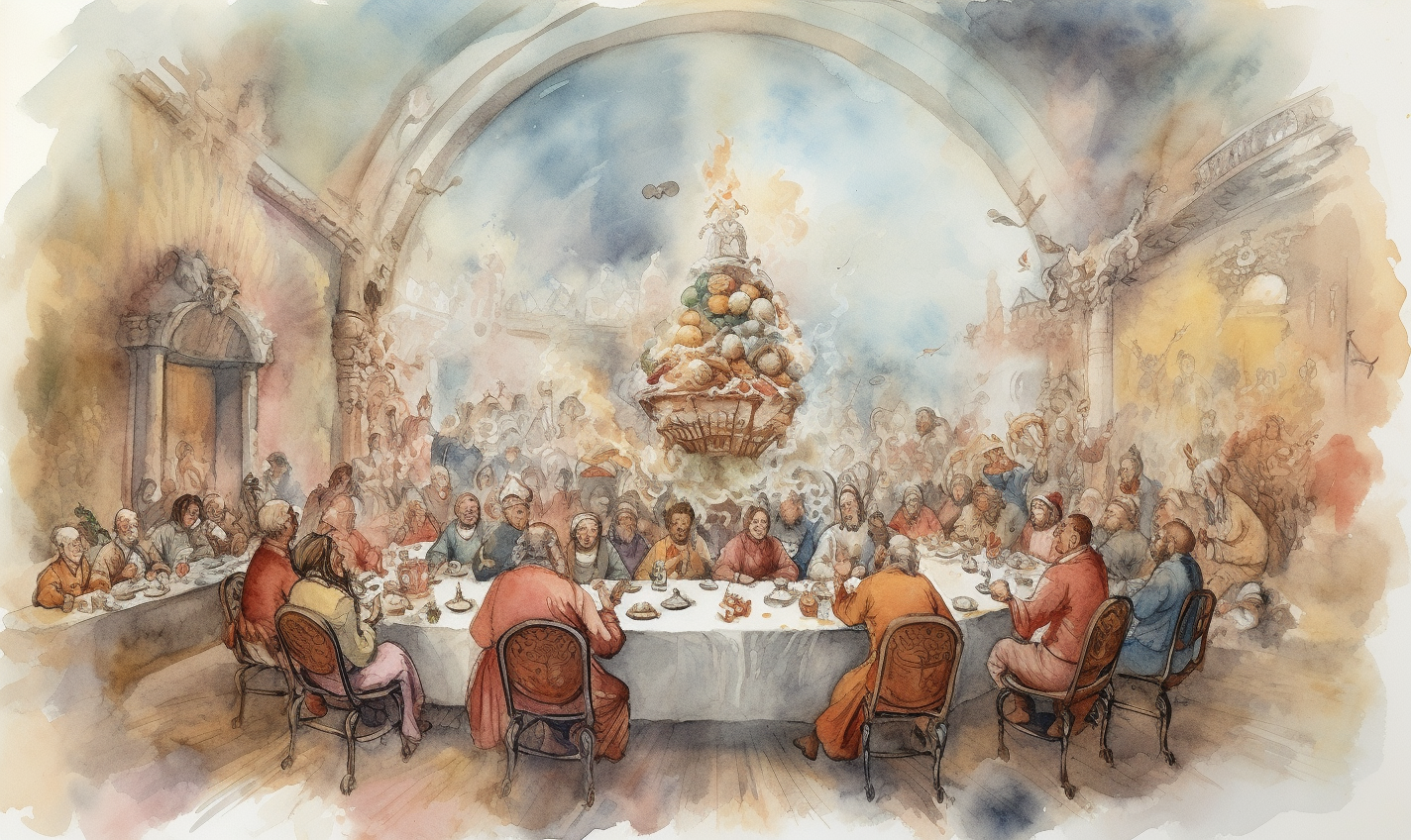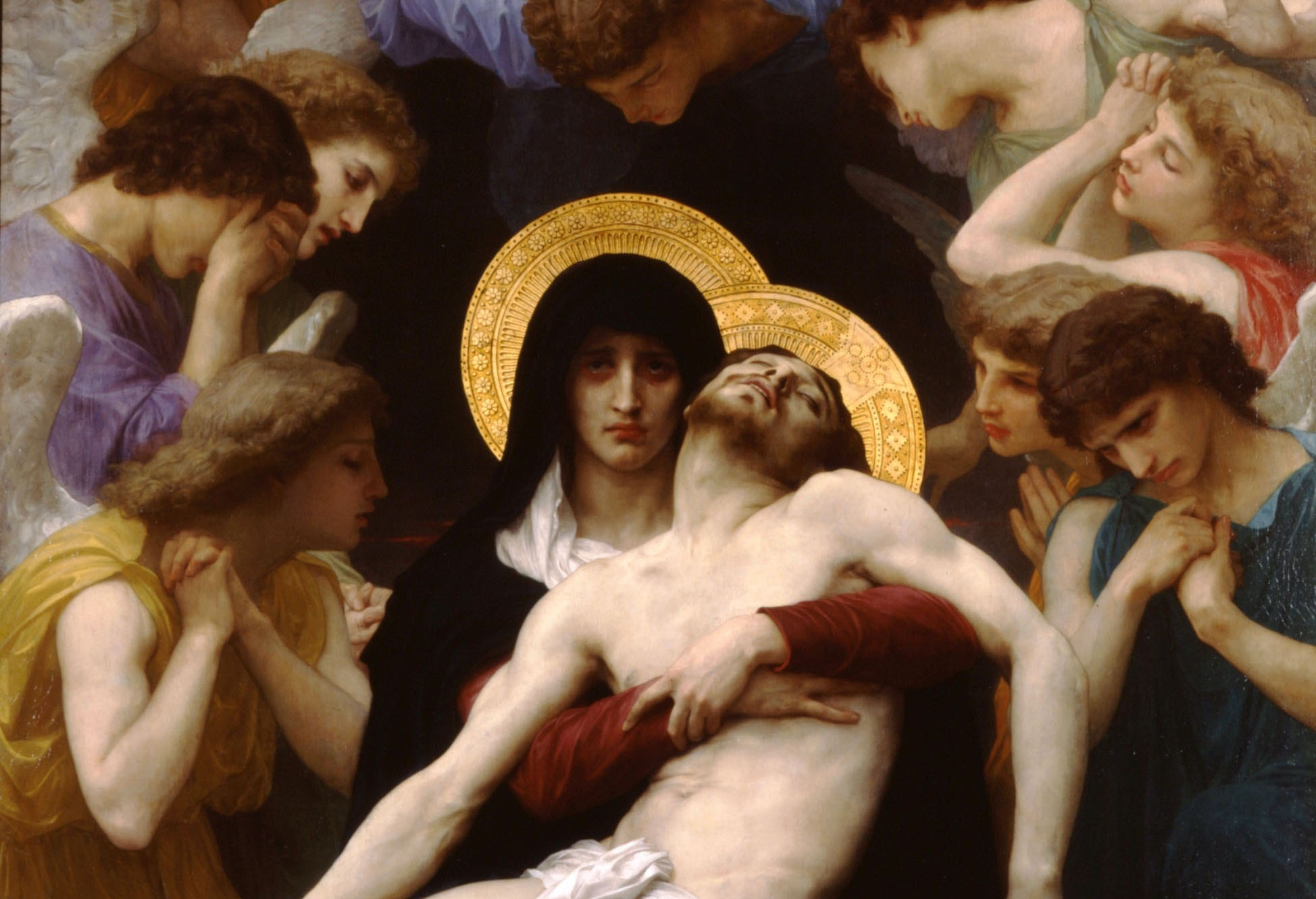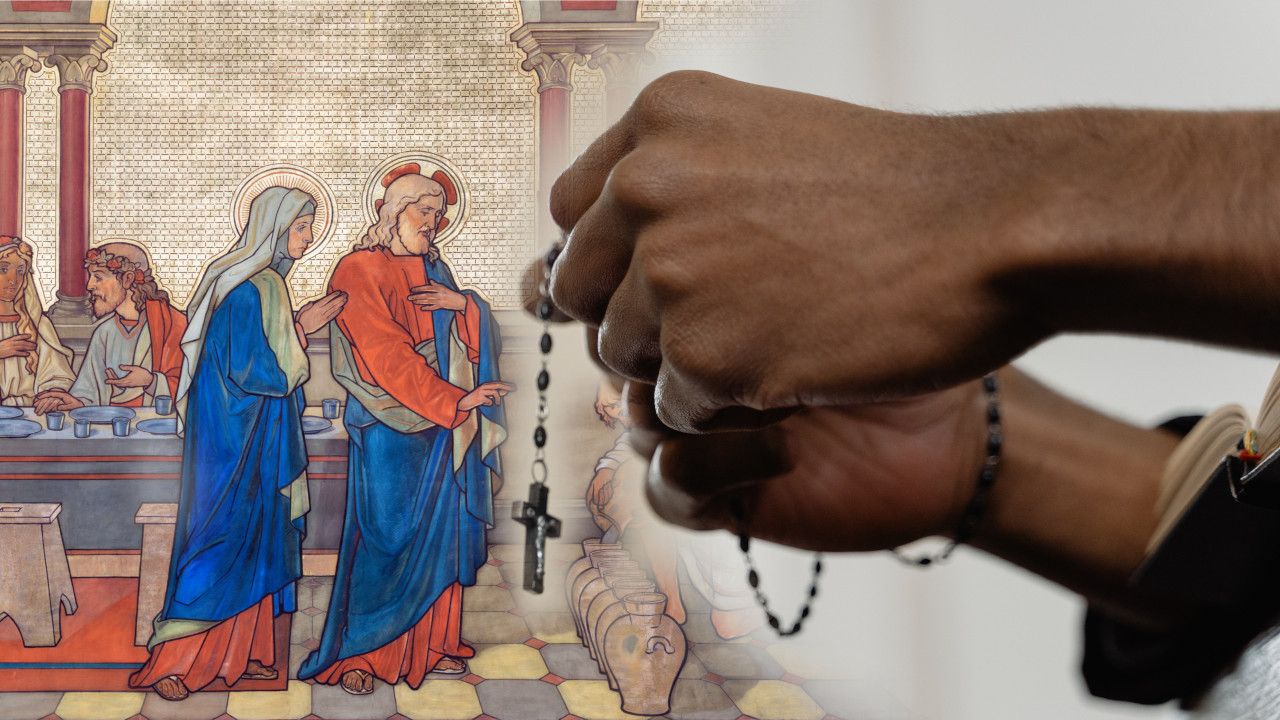Dear Souls and Hearts Members,
Dr. Gerry and I are very grateful for the feedback and comments we’ve received after publishing the first two reflections in this six-part series. Dr. Gerry’s unique approach to understanding ourselves better through a ‘parts’ lens, with the Luminous Mysteries of the Rosary as a guide, stems from a realization he experienced in his clinical work as recalled in the first reflection: “When I began incorporating “parts work” into sessions with my clients, my therapeutic work was elevated to the next level. It wasn’t uncommon for a new client to tell me that they had received more benefit from two or three sessions of parts work with me than they had in years with other forms of therapy.”
Our hope is that through this series and the reflection questions offered, you will learn how to gently ‘go inside’ to work with your parts in a prayerful, self-led way that best fits your internal system and be guided to the next level in your human formation.
Illuminating Parts through the Luminous Mysteries: the Wedding at Cana
By Gerry Crete, Ph.D.
The Second Luminous Mystery, the Wedding at Cana, presents Jesus’ first public miracle. When the wine runs out, Jesus turns water into wine at the request of his mother. Imagine the distress and embarrassment of the wedding banquet hosts when discovering the wine supply dwindling. Any anxiety felt over this impending hospitality disaster was relieved by Jesus when he provided the choicest wine in abundance. From a lack to a surplus – the hosts were freed from fear and shame and given relief and joy. Jesus lifted a heavy burden and bestowed a bountiful blessing.

Unburdening
Richard Schwartz, founder of IFS, introduced the therapeutic process of “unburdening.” It can be described as the identification and then release of extreme beliefs, cognitive distortions, and disordered emotions carried by our parts. We have parts that are carrying burdens of pain, shame, fear, or sadness. We may not fully realize this until we meet our burdened parts, listen to them, and understand them.
Our natural instinct may be to avoid negative feelings. We may naturally want to push them away, suppress them, and lock them up. It takes courage to encounter our hurt parts. When we do, the inmost self will naturally want to help them and provide what they need.
It is interesting that at the Wedding of Cana, it is Mary, Jesus’ mother, who sees the real need and brings this to Jesus’ attention. Perhaps Jesus was thinking of higher things. But it is his mother’s heart who appeals to him, and he responds. He turns water into wine. In the same way the inmost self, with God’s grace, can help turn our pain into joy. It cannot do this until we pause and notice, see the problem or the burden with a loving heart, and then act.
Signs of Peace
When our parts are at war with each other, we experience a lack of inner harmony. We are not able to experience peace, let alone joy, when our burdened parts are in conflict with other parts.
An illustration of external ‘signs of peace’ might be helpful here – consider the age-old tradition that when a soldier entered a home, he would always remove his helmet to indicate peace. Continuing to this day, this is the historical reason men don’t wear hats indoors – a visible sign of entering peacefully.
When our internal parts put aside their burdens, lay down their helmets of war so to speak, they are free to engage peacefully with other parts. When inner conflicts are resolved and the parts release their heavy burdens, they are free to enjoy each other and be in communion with both the inmost self and with God.

Prefiguring the Heavenly Banquet
The Bible often describes the Kingdom of God or the Kingdom of Heaven in terms of a banquet. A feast with good food and wine is the symbol of joy, happiness, good cheer, and fellowship. When our parts are in harmony, when they receive what they need, there is true joy and authentic peace.
It is interesting that at the Wedding in Cana the wine runs out and Jesus’ mother Mary asks him to help. Jesus responds, “Woman, what concern is that to you and to me? My hour has not yet come.” (John 2: 4). Mary hints at a miraculous intervention for the bridegroom, and Jesus sounds indifferent. His answer is perplexing.
Let’s explore the symbolism and significance of this interaction through an IFS parts lens: Jesus represents the inmost self, thinking of the future, a heavenly banquet, a new covenant, the coming of the Kingdom of God. Mary represents an unburdened manager part, thinking of the here and now, the current situation, the immediate need. Their interaction represents a harmonious dialogue between the inmost self and a manager part. When the inmost self sees and hears the manager part and understands its good intentions, it can facilitate God’s grace, in this case a real and awesome miracle.
Ponder that this wedding of Jesus’ friends includes a meal where the couple celebrates their union in a new covenant. The wine represents the joy and celebration of this new beginning. All of Jesus’ actions are purposeful and intentional. Jesus is looking forward to giving the supersubstantial gift of his body and blood in the Eucharist in a communion meal celebrated at the Last Supper. He will establish the new Israel through his death and resurrection, an eternal covenant.
When the head waiter compliments the bridegroom for saving the best wine for last, the wine of the new covenant is prefigured. The best is yet to come. The real banquet, which involves a return from exile, a movement from slavery to freedom, a restoration, and a renewal, appears on the horizon.
Jesus’ miraculous wedding gift is not just an individual experience, or a matter of one sinner repenting and finding God. No, this is a communal event. A wedding, especially as celebrated in the Middle East, is deeply relational and involves the couple, their families and friends, and the entire community. We are not talking a small ceremony or a short reception! We, as a people, are being restored and we as a people will enjoy this new wine together. This speaks, therefore, to the renewal of all our parts with the inmost self and with God and others. The purpose of doing parts work is not just to find inner peace and improve our meditation practices. We are called to be in community with others on their journey in this new Kingdom of God, learning to be fully present to one another and active in our own internal systems too!
Jesus Interacts with Mary – an Unburdened Manager or Mother part?
There are different levels at play in this story of the Wedding at Cana. On the surface we have Mary who is concerned about the wedding itself, and asks Jesus to help relieve the distress of the bride and groom related to the lack of wine. She sees a situation where there is a pressing need. This relates to our own lives where we often have immediate needs that seem crucial and important. Mary recognizes an immediate need and turns to Jesus for help.
Jesus is interesting here because as mentioned previously he seems to initially dismiss her concern. Jesus is perhaps thinking ahead to the ultimate consummation that is to come at the Last Supper and eventually to the Eucharist within the Church. I believe when he says the time has not come, he’s referring to the work he’s planning to do on the Cross. But he pauses and he listens to Mary, he listens like the inmost self might listen to a part who has an immediate need and an immediate concern.
When he turns his attention from his big picture view, and he connects with Mary and what she’s pointing him to, he actually does see where he can be of help and assistance. Our inmost self is also often looking to a higher purpose; it is both earthly and divine, is both in the world but also connected with God. Sometimes our inmost self isn’t seeing what’s right in front of us.
Perhaps in this story Mary represents a manager part, concerned about something in life that is pressing, stepping in to help by catching Jesus’ attention. Sometimes our manager parts are extremely helpful in bringing us down to earth to recognize problems right in front of us where we need to engage. We may at times need to adjust our priorities. We need balance because we can be so busy with the big picture, busy with important things we need to do, with work, with planning for the future, that we may fail to realize there is a small crisis brewing right in front of us and we need to be present in the here and now when we’re needed.

Mary may represent a manager part, but I also think she is more than just that. She represents a maternal part, a part that is caring for others, looking out for others, nurturing, caretaking, concerned, loving, and attentive. Jesus, as the inmost self in this story, still needs his mother and enjoys being in connection with her.
The Bride and her Family
Although we don’t hear from them directly, the wedding banquet hosts may represent manager parts preoccupied with hosting and entertaining, making sure the wedding went off without a hitch, that all the guests were enjoying themselves, and the wine was flowing. If they were freaking out, if they were in distress and experiencing high levels of anxiety, they may have taken on negative self-talk burdens.
The parents may have been taking on a burden of feeling inadequate, maybe feeling like a failure, or feeling like they were not doing right by their child or that they were an embarrassment to the community. We don’t actually know, but if they were taking on those kinds of burdens then on some level Christ, in meeting their need, was helping to relieve that burden. We don’t see him directly approaching them and connecting with them. We don’t see him letting them know that they’re good parents. His actions, however, at the behest of his mother, provided instant relief and over abundant consolation.
We don’t know if the banquet hosts or servers considered asking for help or if they thought they were alone with their humiliating problem. Did Mary overhear a worried hostess? Or did she observe distressed glances between servers and the head waiter as the wine supply dwindled? While this remains a mystery, we clearly see that Mary, as a manager/protector part, advocates for them all. Sometimes our protective parts seek to solve problems (with good intentions) in ways that are unhealthy or even destructive. But in the case of Mary, as an unburdened manager part, she assists promptly with love and concern. And Jesus responds positively to her request, bringing the banquet to the next level.
Somatization, Anxiety, and our Parts
We may have protective parts calling out for help. Sometimes this takes the form of physical pain, tension in our muscles, or uneasiness in our gut. When our cry for help isn’t being heard, another part of the body reacts. It is very important then that we learn to listen to our parts, and recognize our body’s messages, just like Jesus listened to Mary. When we connect with our parts and listen to them, we give them a voice.
When we are unaware of our own parts, they have a way of informing us through our body or through our anxiety. Anxiety is not so much an emotion; it is a bodily response to a perceived threat, causing physical reactions such as raised blood pressure, increased heart rate, muscle tension, respiratory changes, and the feeling of pressure in our chest. Our emotions become much more heightened when we experience anxiety. Using diaphragmatic breathing and muscle relaxation techniques can relieve anxiety. Additionally, we can enter a state of recollection, look inside, and recognize that there is a part calling out for help.
In today’s society we often try to resolve the anxiety of our internal world by using medication, substances, and/or engaging in online activities to distract ourselves. We need to learn to pause and sit with ourselves and look inside and see and hear what our parts are telling us. It might be as simple as the part, like Mary, saying that we are running out of wine. If we are listening, we might be able to say, I can help with that. But if we’re not listening then the problems may seem overwhelming. When our body reacts, our emotions become dysregulated, and we may feel like we have no options. In this ‘fight or flight’ mode, our reasoning ability is severely limited.
In reality, like the hosts of the wedding banquet at Cana, we may not be aware that we also have a divine guest who holds the keys to Heaven and Earth. We too have internal resources available. When we listen to our parts, engage our inmost self, we too can receive the graces we need to handle difficult situations. Mary is a good model for us, perhaps she can help us train our manager parts as ‘first responders,’ who come confidently to the rescue when we are overwhelmed. Let’s ask her to help us recognize the ‘early warning systems’ our bodies send in times of stress and anxiety.
Mary as a Model for the Inmost Self
Up until now we have shown how Christ represents the inmost self and the other characters represent parts in the Luminous Mysteries. But from a different angle, Mary can also be seen as a model for the inmost self. She is always pointing to Christ and shining a light on her son. Mary’s role is to always bring us closer to Christ. Consider the Annunciation: Mary responds to the message brought by the Angel Gabriel “Behold, I am the handmaid of the Lord. May it be done to me according to your word.” (Luke 1:38).
Mary represents the heart’s deepest acceptance of Christ as savior. Her role is one of surrender and bringing Christ into the world. She calls us to be aware of the presence of God within us and she invites us into prayer with him. Even when Christ is suffering on the cross, Mary is present and loving him. In the Pietà image, Mary is holding her dead son with reverence as she mourns.

From his agony on the cross, Jesus gives his mother into the care of the apostle John. She is the heart of the Church, the mother of all Christians, and Jesus makes sure she is loved and protected. Like she did at the wedding at Cana, she continues as the Queen of Heaven to advocate for the needs of her precious children. In a similar way, the role of the inmost self is to lovingly work with our parts by listening to them, advocating for them, extending compassion to them, bringing them a sense of the 8 Cs of IFS: Compassion, Curiosity, Calm, Clarity, Courage, Connectedness, Confidence, Creativity. And most importantly, Mary connects us with Christ by bringing our needs to him.
Whether we see Mary as an unburdened manager part or as a model for the inmost self, or as both, we can reflect on what the Second Luminous Mystery can teach us about our inner world and how we can find relief from anxiety by recognizing and listening to our parts, connecting with Christ, and releasing our burdens with his grace.
In closing, just a reminder: I welcome and cherish your thoughts, critiques, and new insights. Feel free to reach out to me with your comments at crisis@soulsandhearts.com.
Reflection Questions
1) At the Wedding at Cana, we see how Mary draws Jesus’ attention and presents him with an immediate need. Jesus seems to initially dismiss her request but then performs a public miracle. Do you have times when your parts are crying out for help but you don’t hear them or you dismiss their concerns? Do your parts sometimes speak to you through your body? Take a moment of recollection, and listen to your parts, notice what happens in your body, and ask your parts about their concerns. What do you notice and hear?
2) Reflect on a time in the past when you felt fear and anxiety. How was that anxiety relieved? How did you feel when the burden was lifted? Were you able to experience joy and gratitude like the wedding hosts, servers and guests at Cana? Do you have parts still holding onto the anxiety or the associated negative beliefs, even though the situation is over? See if it is safe and manageable to release any anxiety that may be left.
Join us next week as we explore the Third Luminous Mystery – Jesus’ Proclamation of the Kingdom of God!
Be With the Word for Corpus Christi – addiction vs. connection and intimacy
Come join Dr. Gerry and me for a 42-minute discussion on how addictive behaviors are maladaptive attempts to seek something good in our episode for Corpus Christi. We explore how addiction is like a false idol, separating us from Christ, and yielding the bad fruits of dehumanization and isolation. Bringing that reality to light is a first step of healing and integration of self. Dr. Gerry and I read the Mass readings for Corpus Christi aloud here.
Lifting Sexual Burdens: An IFS demonstration with Drew Boa – an episode of Interior Integration for Catholics
Have you ever wondered what inner work with Internal Family Systems looks like with troubling sexual issues? Join me for episode 114 of the IIC podcast as fellow podcaster and coach Drew Boa and I review and unpack our unburdening of three of his parts from a sexual problem. The Christian therapists in our live audience ask questions and contribution to the discussion. This episode is quite long – two hours and twenty minutes, but worth the time to experience it. As you watch (or listen) in the observer role, notice what the experience brings up for your parts. The video is here and on our IIC landing page and the audio can be streamed here or found wherever you listen to podcasts.
The Resilient Catholics Community
If you resonate with the Interior Integration for Catholics podcast (especially the experiential exercises), if Dr. Gerry’s discussion of parts in this reflection makes so much sense to you, if you recognize your need for better human formation, and if you up for a new challenge, then the RCC may be a great fit for you.
Read about the RCC at our landing page to get the ball rolling.
We are Catholics together on a pilgrimage to better human formation, bringing the best of human formation resources, grounded in a Catholic understanding of the human person to you in a structured, deliberate way, so that we can walk together. I’ve created more than 100 experiential exercises for our RCC members, plus our Inner Connections talks, our monthly office hours – and now RCC Lead Navigator Marion Moreland is contributing her special content on a regular basis as well. We don’t offer therapy or counseling, but there are so many other ways that we can open ourselves up to better human formation.
Applying does not mean you have to join – there is a process of discernment and accompaniment. And in the meantime, you receive an individualized, personal report that helps you get to know your parts and to better understand how your parts interact within your system. See sample PDFs for a sample fictional report describing the parts and their interactions for a man and a woman. Then you get a 15 minutes Zoom interview either with Marion Moreland (for the women) or me (for the men) to discuss your report – that just part of the application, with no obligation to join the RCC. Check out our 19-minute experiential exercise to help you discern about applying to the RCC. It would be good to travel together.
Warm regards in Christ and His Mother,
Dr. Peter
